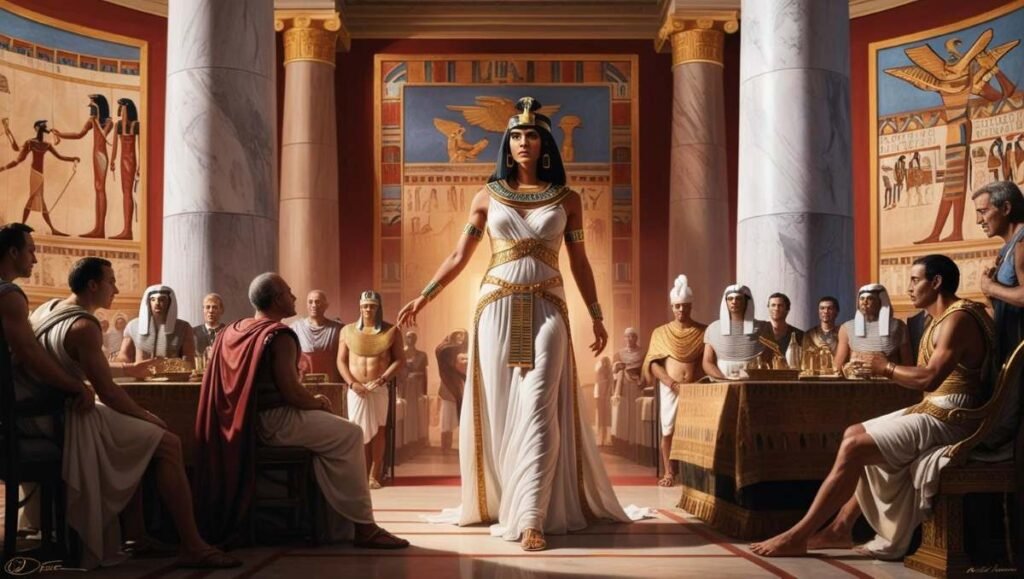
Cleopatra VII, the last ruler of the Ptolemaic Kingdom of Egypt, remains one of the most enigmatic figures in history. Known for her intelligence, political acumen, and powerful alliances with the likes of Julius Caesar and Mark Antony, Cleopatra’s life and reign continue to captivate the imagination of historians, scholars, and artists alike. Despite her death over two millennia ago, Cleopatra’s influence on the ancient world—and especially on Rome—has endured, shaping politics, culture, and leadership throughout the ages.
In this article, we explore Cleopatra’s enduring legacy, how her leadership shaped Egypt’s future, and her impact on Rome. We’ll also delve into the myths surrounding her beauty, her cultural contributions, and the intellectual legacy she left behind.
Table Of Contents
- Cleopatra’s Leadership: A Catalyst for Egypt’s Transformation
- Cleopatra’s Lasting Impact on Roman Politics
- Cleopatra’s Power Play: The Politics of Love and War
- Debunking the Myths: Cleopatra’s Beauty and Charisma
- Cleopatra’s Influence on Art and Architecture: A Cultural Revolution
- Cleopatra’s Intellectual Legacy: A Pharaoh Ahead of Her Time
- How Cleopatra’s Story Has Been Told: From Shakespeare to Hollywood
- The Ptolemaic Dynasty: Cleopatra’s Role in Egypt’s Royal Family
- In Conclusion: Cleopatra’s Enduring Influence
Cleopatra’s Leadership: A Catalyst for Egypt’s Transformation
Cleopatra ascended to the throne during a turbulent time for Egypt. Egypt was no longer the great power it once was under the pharaohs, and Cleopatra’s reign would mark a significant shift in the kingdom’s fortunes. Her leadership style—marked by strategic alliances, savvy diplomacy, and sheer determination—allowed Egypt to hold its own against the growing might of Rome.
Under her rule, Egypt became a center of culture and innovation. Cleopatra revitalized Egypt’s economy, strengthened its military, and reasserted its independence. One of her first acts as queen was to reclaim the throne from her younger brother, Ptolemy XIII, and stabilize the kingdom. Her political vision sought to maintain Egypt’s sovereignty while navigating the increasingly powerful Roman Empire.
Did You Know? Cleopatra was the first Ptolemaic ruler to learn the Egyptian language, setting her apart from her predecessors, who spoke Greek. This allowed her to connect with her people on a deeper level.
Her political prowess extended beyond Egypt’s borders, particularly in her relationships with Julius Caesar and Mark Antony, both of whom were powerful Roman figures. Cleopatra’s diplomacy was as much about love as it was about power—by forming strategic relationships with these men, Cleopatra ensured that Egypt would remain independent of Roman rule.
“Cleopatra’s political genius lay in the ability to play Rome’s powerful figures against each other, securing her throne and Egypt’s place in the world.”
Cleopatra’s Lasting Impact on Roman Politics
Cleopatra’s influence on Roman politics is often overshadowed by her legendary love affairs, yet her strategic alliances with Julius Caesar and Mark Antony were crucial in shaping the future of both Egypt and Rome. Her relationship with Julius Caesar not only secured her position on the throne but also placed her firmly in the heart of Roman affairs.
Through Caesar, Cleopatra solidified Egypt’s political standing and initiated economic reforms that benefitted both nations. After Caesar’s assassination, Cleopatra aligned herself with Mark Antony, further cementing her role as a central figure in Roman politics. Their alliance, however, would prove to be a source of contention in Rome, especially as Antony’s rivalry with Octavian (later Augustus) escalated.
Cleopatra’s involvement in the Roman civil wars and her connection to key Roman figures became a catalyst for the fall of the Roman Republic and the rise of the Roman Empire. Her alliances and eventual defeat at the hands of Octavian were pivotal moments in history.
“Cleopatra was not just a lover or seductress; she was a skilled diplomat whose alliances with Rome’s greatest leaders altered the course of history.”
Cleopatra’s Power Play: The Politics of Love and War
The political dynamics between Cleopatra and Rome were marked by a delicate dance of love and war. Cleopatra used her personal relationships to her advantage, understanding that her ability to navigate Roman politics required both political alliances and personal charisma.
Her relationship with Julius Caesar was both romantic and politically significant. After her initial meeting with Caesar, Cleopatra’s influence over him grew, and their son, Caesarion, was born in 47 BC. This act cemented her role as an influential figure in Roman politics. However, after Caesar’s assassination, Cleopatra aligned herself with Mark Antony, a move that would define her legacy.
Antony’s relationship with Cleopatra directly challenged Octavian’s ambitions for power. The rivalry between Antony and Octavian reached its peak at the Battle of Actium in 31 BC, where Cleopatra and Antony were decisively defeated. Cleopatra’s use of love to secure her political power ultimately led to her downfall, yet her influence on Rome remained far-reaching.
“Cleopatra’s romantic entanglements were not just about passion; they were shrewd political moves in a time of immense power struggles.”
Debunking the Myths: Cleopatra’s Beauty and Charisma
While Cleopatra’s beauty has been widely celebrated, it is essential to look beyond the myths and focus on the real qualities that made her such a powerful and influential ruler. Ancient texts describe Cleopatra as attractive, but her charm was undoubtedly more than skin deep.
Cleopatra was highly intelligent, well-educated, and an astute diplomat. She was fluent in several languages and was known for her ability to engage in sophisticated philosophical discussions. Her charm lay in her ability to combine intellect, charisma, and political savvy—qualities that were far more important than her physical appearance in establishing her dominance.
“Cleopatra’s beauty was not her greatest asset; it was her intelligence, her political savvy, and her ability to command respect in a male-dominated world.”
Cleopatra’s Influence on Art and Architecture: A Cultural Revolution
Cleopatra’s reign also left a lasting impact on the cultural landscape of Egypt and Rome. Under her leadership, Egypt saw a resurgence in art, literature, and architecture, blending Egyptian traditions with Greek and Roman influences. Cleopatra was not only a patron of the arts but also a visionary who sought to leave her mark on Egypt’s cultural identity.
Her contributions can be seen in the architectural splendor of Alexandria, which became a center of learning and art during her reign. Cleopatra also revitalized Egypt’s Library of Alexandria, fostering an environment that encouraged the preservation and development of knowledge.
Her reign also saw the flourishing of Egyptian art, which was infused with Greek and Roman styles, creating a new visual language that symbolized her rule.
Cleopatra’s Intellectual Legacy: A Pharaoh Ahead of Her Time
Cleopatra’s intellect was a key aspect of her reign. Educated in the traditions of Alexandria’s Great Library, she was a philosopher, scientist, and patron of the arts. Her involvement in the intellectual life of Egypt was unparalleled, and her reign marked a golden age of learning in Egypt.
Her intellectual pursuits included astronomy, mathematics, and philosophy, and she surrounded herself with some of the greatest minds of the ancient world. Cleopatra understood the importance of knowledge in maintaining power, and her education in Greek philosophy and science helped her navigate the complex political landscape of her time.
“Cleopatra’s intellectual curiosity and commitment to learning set her apart from many of her contemporaries.”
How Cleopatra’s Story Has Been Told: From Shakespeare to Hollywood
The narrative of Cleopatra has been passed down through the ages, from Shakespeare’s “Antony and Cleopatra” to modern portrayals in Hollywood. Each retelling has highlighted different aspects of her character, from the seductive queen to the powerful political strategist.
Hollywood’s depictions of Cleopatra often focus on her romantic relationships, while other interpretations, such as those in literature and theatre, emphasize her political and intellectual prowess. These portrayals have had a significant impact on how we view Cleopatra today—both as a symbol of femininity and as a brilliant ruler.
“Cleopatra’s legacy has been shaped by the way her story is told, whether as a romantic heroine or as a powerful queen who fought for Egypt’s survival.”
The Ptolemaic Dynasty: Cleopatra’s Role in Egypt’s Royal Family
Cleopatra’s family history was fraught with intrigue, betrayal, and power struggles. As a member of the Ptolemaic Dynasty, Cleopatra inherited a throne surrounded by family rivalries. The Ptolemies were known for their complex dynastic struggles, and Cleopatra’s early life was marked by tension and conflict.
Cleopatra’s ability to secure her throne and eliminate rivals was a testament to her ruthlessness and political cunning. Her reign marked the final chapter of the Ptolemaic Dynasty, and her death marked the end of Egypt’s status as an independent kingdom.
Her story serves as a powerful reminder of the fragility of dynastic power and the constant struggles for control that shaped ancient Egypt.
In Conclusion: Cleopatra’s Enduring Influence
Cleopatra’s story is one of ambition, intellect, and survival. Her leadership shaped the future of Egypt and her relationships with Rome’s greatest figures altered the trajectory of history. Though her life ended tragically, her influence continues to resonate through the ages, inspiring scholars, artists, and leaders alike.
Her legacy reminds us of the importance of education, diplomacy, and the complex interplay of power and love. Cleopatra may have been Egypt’s last pharaoh, but her story has ensured that her influence will live on for generations to come.







